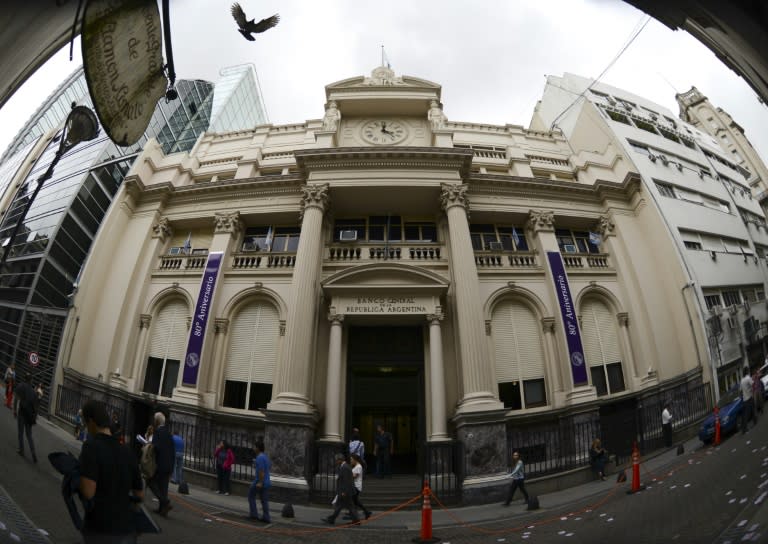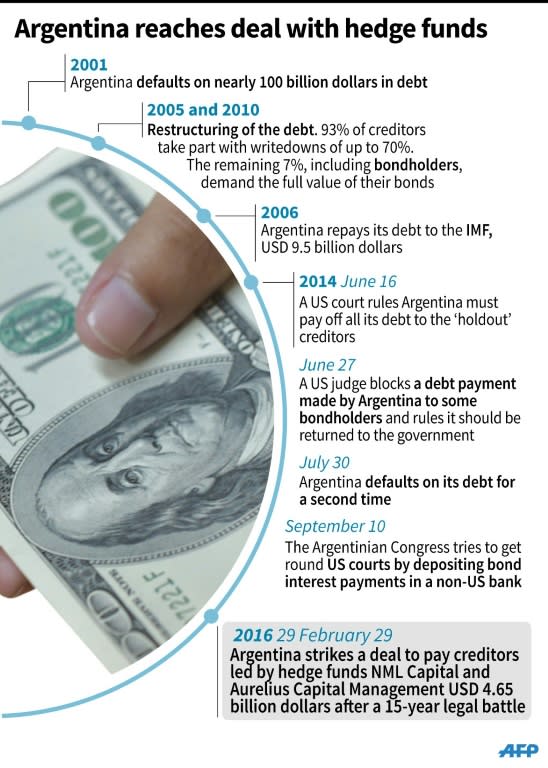Argentina lawmakers back deal to repay holdout creditors
Argentina's chamber of deputies voted Wednesday to approve a repayment deal with holdout creditors, as the nation seeks to finally close the door on 15 years of litigation over its defaulted bonds. The vote was a major victory for conservative President Mauricio Macri, who had to persuade the opposition-controlled Congress to set aside political differences and swallow what his administration described as an unpalatable but inescapable deal to end the debt morass. After a marathon debate that lasted some 20 hours, the bill passed the lower house by a vote of 165 to 86, gaining support from moderate opposition lawmakers. It now goes to the Senate, where it likely faces stiffer opposition, political observers said. But the president warned the alternative was hyperinflation and a painful economic adjustment. "I'm sure that on April 14 we will pay and escape default," he said before the vote. Macri took office in December promising to revive the stagnant economy by rolling back his leftist predecessor Cristina Kirchner's policies -- including her refusal to strike a deal with the holdout creditors, which she branded "vultures." Macri's government needs the Congress to lift legal blocks instituted under Kirchner on repaying the holdouts, with which Buenos Aires has been fighting in a US court for years. After long refusing to pay, in February the government offered $6.5 billion to resolve their claims of $9 billion. - Bitter pill - The holdouts are the minority of creditors which refused to go along with the restructuring of the country's debt after it defaulted on nearly $100 billion in 2001. The main holdouts were hedge funds which bought up the defaulted debt at steep discounts, aiming to recover the full value, and in 2012 the New York federal district court ruled in their favor. Macri's camp admitted the deal was a bitter pill, but said it was necessary medicine for the country to return to global capital markets and get the economy back on track. "Of course this deal is not ideal nor desirable," said Mario Negri, a lawmaker allied with Macri's center-right coalition. But he urged his colleagues to vote for the bill anyway. Opposition moderates such as lawmaker Sergio Massa, one of Macri's opponents in last year's presidential election, reluctantly endorsed the bill. "There's a court ruling against us and we have to act. We generously and firmly support the government's initiative and will expect the same when we present our own legislation," Massa said. Argentina has been mostly locked out of global capital markets and Macri, tasked with reviving Latin America's third-largest economy, has vowed to pay off the creditors and move forward. If the Congress does remove the legal barriers to payment, the judge in the US case, Thomas Griesa, has agreed to lift an injunction that effectively prohibits Argentina from borrowing the new money necessary to clear out the old claims. Not all remaining holdouts have agreed to the deal. Analysts estimate the full cost of settling all outstanding claims could total $15 billion. The vote was the first legislative triumph for Macri, who had so far relied on executive power to push through market-friendly reforms such as scrapping foreign exchange controls and import restrictions. His administration was keen to show it was capable of getting bills through Congress despite lacking a majority.





